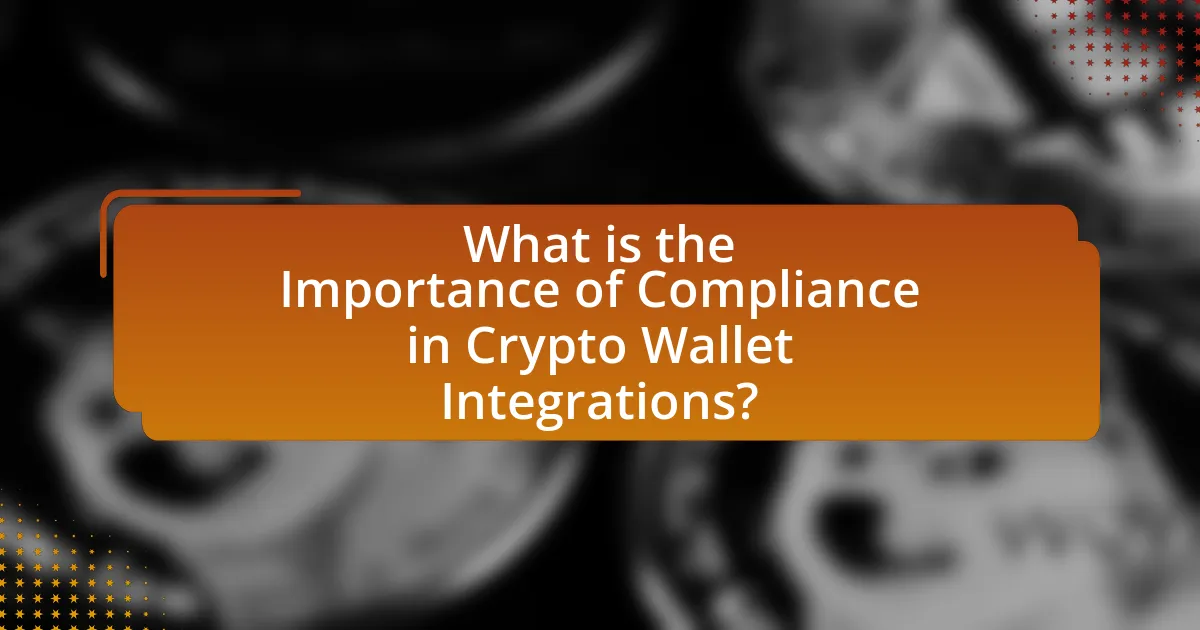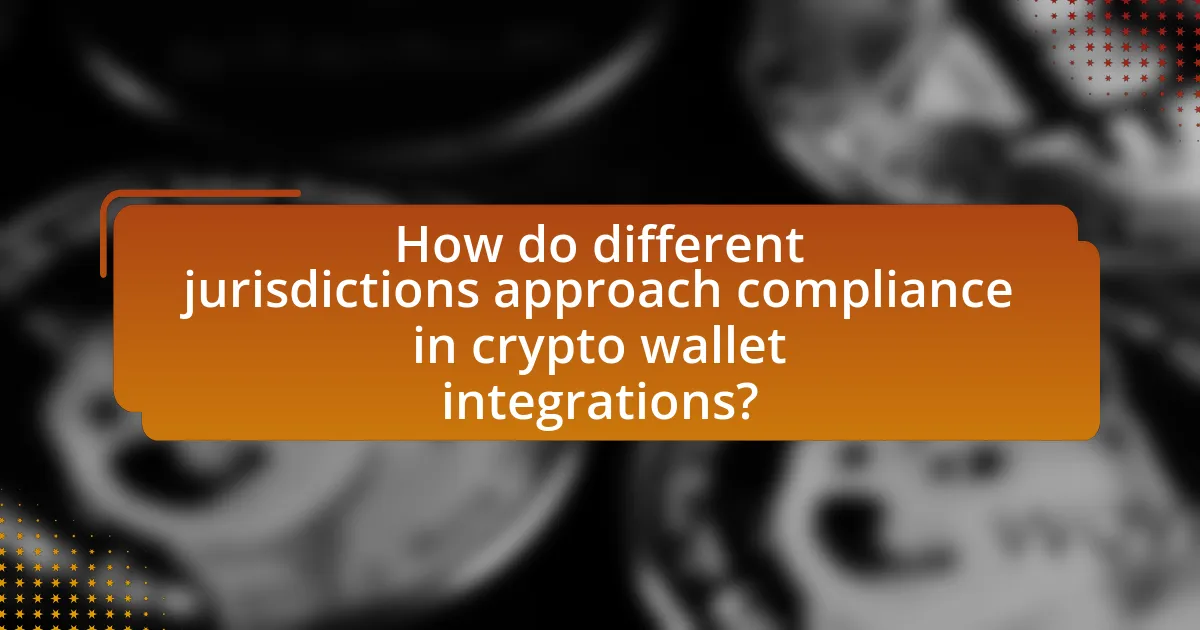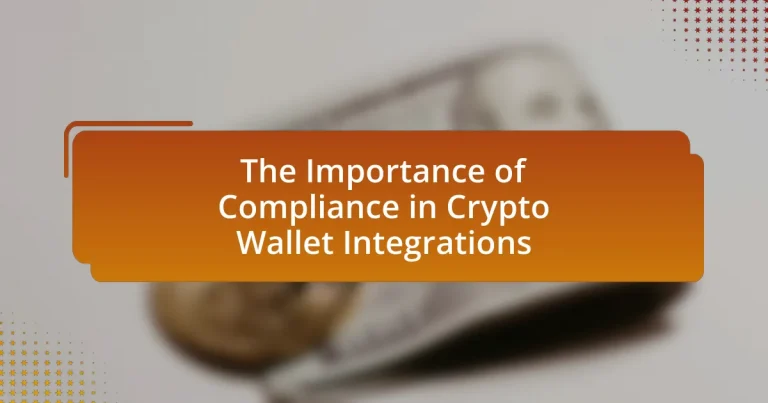Compliance in crypto wallet integrations is essential for legal adherence and user trust, as it involves implementing Know Your Customer (KYC) and Anti-Money Laundering (AML) measures mandated by regulatory frameworks like the Financial Action Task Force (FATF) guidelines. Non-compliance can result in severe penalties, including fines and operational shutdowns, while adherence enhances user confidence and protects businesses from legal risks and reputational damage. The article explores the regulatory frameworks governing crypto wallets, the impact of compliance on user trust, the risks associated with non-compliance, and the evolving landscape of regulations across different jurisdictions. Additionally, it discusses best practices for ensuring compliance and the role of emerging technologies in maintaining regulatory standards.

What is the Importance of Compliance in Crypto Wallet Integrations?
Compliance in crypto wallet integrations is crucial for ensuring legal adherence and fostering trust among users. Regulatory frameworks, such as the Financial Action Task Force (FATF) guidelines, mandate that crypto wallets implement Know Your Customer (KYC) and Anti-Money Laundering (AML) measures to prevent illicit activities. Non-compliance can lead to severe penalties, including fines and operational shutdowns, as evidenced by regulatory actions against non-compliant entities in various jurisdictions. Furthermore, compliance enhances user confidence, as customers are more likely to engage with platforms that prioritize security and regulatory standards.
Why is compliance critical in the context of crypto wallet integrations?
Compliance is critical in the context of crypto wallet integrations because it ensures adherence to legal and regulatory frameworks, which helps prevent fraud, money laundering, and other illicit activities. Regulatory bodies, such as the Financial Action Task Force (FATF), mandate compliance with Anti-Money Laundering (AML) and Know Your Customer (KYC) regulations, which are essential for maintaining the integrity of the financial system. Non-compliance can lead to severe penalties, including fines and legal action, as evidenced by cases where companies faced significant repercussions for failing to meet regulatory standards. Therefore, compliance not only protects users and enhances trust but also safeguards the business from legal risks and reputational damage.
What are the regulatory frameworks governing crypto wallets?
Regulatory frameworks governing crypto wallets primarily include anti-money laundering (AML) and know your customer (KYC) regulations, which require wallet providers to verify user identities and monitor transactions. In the United States, the Financial Crimes Enforcement Network (FinCEN) classifies crypto wallet providers as money services businesses (MSBs), subjecting them to federal regulations. Similarly, the European Union’s Fifth Anti-Money Laundering Directive (5AMLD) mandates that crypto service providers comply with AML and KYC requirements. These regulations aim to prevent illicit activities and enhance the security of digital asset transactions, ensuring that wallet providers operate within legal boundaries.
How does compliance impact user trust in crypto wallets?
Compliance significantly enhances user trust in crypto wallets by ensuring adherence to regulatory standards and security protocols. When crypto wallets comply with regulations such as Anti-Money Laundering (AML) and Know Your Customer (KYC) requirements, users perceive these wallets as safer and more reliable. A study by Chainalysis in 2021 indicated that 75% of users prefer platforms that demonstrate regulatory compliance, as it reduces the risk of fraud and enhances the overall security of their assets. Therefore, compliance not only fosters a sense of security but also builds a positive reputation for crypto wallets in the market.
What are the potential risks of non-compliance in crypto wallet integrations?
The potential risks of non-compliance in crypto wallet integrations include legal penalties, financial losses, and reputational damage. Legal penalties arise from violations of regulations such as anti-money laundering (AML) and know your customer (KYC) laws, which can result in fines or sanctions from regulatory bodies. Financial losses can occur due to the inability to operate legally, leading to lost business opportunities and potential lawsuits from users. Reputational damage can severely impact user trust and brand integrity, as seen in cases where companies faced backlash for failing to adhere to compliance standards, ultimately affecting their market position.
What legal consequences can arise from non-compliance?
Non-compliance can lead to significant legal consequences, including fines, penalties, and potential criminal charges. Regulatory bodies, such as the Financial Crimes Enforcement Network (FinCEN) and the Securities and Exchange Commission (SEC), impose strict compliance requirements on crypto wallet integrations to prevent money laundering and fraud. For instance, failure to adhere to Anti-Money Laundering (AML) and Know Your Customer (KYC) regulations can result in fines that may reach millions of dollars, as seen in cases like the $18 million penalty imposed on BitMEX for non-compliance. Additionally, companies may face lawsuits from affected parties or regulatory actions that could lead to the suspension of operations.
How can non-compliance affect the reputation of a crypto wallet provider?
Non-compliance can severely damage the reputation of a crypto wallet provider by eroding trust among users and stakeholders. When a provider fails to adhere to regulatory standards, it raises concerns about the security and legitimacy of its services, leading to potential loss of customers and market share. For instance, in 2020, the crypto exchange BitMEX faced legal action for non-compliance with anti-money laundering regulations, resulting in a significant decline in user trust and a drop in trading volume. Such incidents highlight that non-compliance not only invites legal repercussions but also tarnishes the provider’s image, making it difficult to attract new users and retain existing ones.

How do different jurisdictions approach compliance in crypto wallet integrations?
Different jurisdictions approach compliance in crypto wallet integrations by implementing varying regulatory frameworks that address anti-money laundering (AML) and know your customer (KYC) requirements. For instance, the European Union enforces the Fifth Anti-Money Laundering Directive, which mandates that crypto wallet providers conduct KYC checks on users, while the United States has a patchwork of state-level regulations and federal guidelines from agencies like FinCEN, requiring similar compliance measures. In contrast, jurisdictions like Malta have established a comprehensive legal framework specifically for blockchain technology, promoting innovation while ensuring compliance with AML and KYC standards. These differences highlight the necessity for crypto wallet providers to adapt their compliance strategies based on the specific legal requirements of each jurisdiction they operate in.
What are the key differences in compliance requirements across regions?
Key differences in compliance requirements across regions include variations in regulatory frameworks, data protection laws, and anti-money laundering (AML) obligations. For instance, the European Union mandates strict adherence to the General Data Protection Regulation (GDPR), which emphasizes user consent and data privacy, while the United States has a more fragmented approach with state-specific regulations and the Bank Secrecy Act focusing on AML. Additionally, Asia-Pacific regions may prioritize different aspects, such as the Financial Action Task Force (FATF) guidelines, which influence compliance measures in countries like Japan and Singapore. These regional differences necessitate tailored compliance strategies for crypto wallet integrations to ensure adherence to local laws and regulations.
How do the EU regulations differ from those in the US regarding crypto wallets?
EU regulations on crypto wallets emphasize stringent anti-money laundering (AML) and know-your-customer (KYC) requirements, while US regulations vary significantly by state and are generally less uniform. In the EU, the Fifth Anti-Money Laundering Directive mandates that crypto wallet providers verify the identity of users and report suspicious activities, creating a cohesive regulatory framework across member states. Conversely, in the US, the Financial Crimes Enforcement Network (FinCEN) requires compliance with AML laws, but the lack of a federal standard means that states can impose their own regulations, leading to a patchwork of compliance requirements. This difference in regulatory approach affects how crypto wallet providers operate in each jurisdiction, with EU firms facing more consistent compliance obligations compared to their US counterparts.
What role do international standards play in compliance for crypto wallets?
International standards play a crucial role in ensuring compliance for crypto wallets by providing a framework for security, interoperability, and regulatory adherence. These standards, such as those set by the International Organization for Standardization (ISO), help establish best practices for data protection, transaction integrity, and user authentication. For instance, ISO/IEC 27001 outlines requirements for an information security management system, which is vital for protecting sensitive user data in crypto wallets. By adhering to these international standards, crypto wallet providers can enhance trust among users and regulators, thereby facilitating smoother operations in a complex regulatory landscape.
How can crypto wallet providers ensure compliance with regulations?
Crypto wallet providers can ensure compliance with regulations by implementing robust Know Your Customer (KYC) and Anti-Money Laundering (AML) procedures. These measures involve verifying the identities of users and monitoring transactions for suspicious activity, which aligns with regulatory requirements set by authorities such as the Financial Action Task Force (FATF). For instance, in 2021, the FATF updated its guidelines to emphasize the need for virtual asset service providers, including crypto wallets, to adhere to these compliance standards. By adopting these practices, wallet providers can mitigate risks and maintain regulatory adherence, thereby fostering trust and security in the cryptocurrency ecosystem.
What best practices should be implemented for compliance in crypto wallet integrations?
To ensure compliance in crypto wallet integrations, organizations should implement Know Your Customer (KYC) and Anti-Money Laundering (AML) protocols. KYC involves verifying the identity of users to prevent fraud and illicit activities, while AML practices help monitor transactions for suspicious behavior. According to the Financial Action Task Force (FATF), adherence to these protocols is essential for mitigating risks associated with cryptocurrency transactions. Additionally, integrating robust security measures, such as multi-factor authentication and encryption, is crucial to protect user data and assets. Regular audits and compliance assessments further enhance adherence to regulatory standards, ensuring that the wallet integration remains aligned with evolving legal requirements.
How can technology assist in maintaining compliance for crypto wallets?
Technology can assist in maintaining compliance for crypto wallets by implementing automated monitoring systems that track transactions and user activities in real-time. These systems utilize algorithms to analyze transaction patterns, ensuring adherence to regulatory requirements such as Anti-Money Laundering (AML) and Know Your Customer (KYC) protocols. For instance, blockchain analytics tools can identify suspicious activities and generate alerts, enabling timely intervention. Additionally, smart contracts can enforce compliance rules directly within the wallet’s functionality, reducing the risk of human error. This integration of technology not only streamlines compliance processes but also enhances transparency and accountability in crypto transactions.

What are the future trends in compliance for crypto wallet integrations?
Future trends in compliance for crypto wallet integrations include increased regulatory scrutiny, enhanced KYC (Know Your Customer) and AML (Anti-Money Laundering) requirements, and the adoption of decentralized identity solutions. Regulatory bodies worldwide are tightening their frameworks to ensure that crypto wallets adhere to existing financial regulations, which is evidenced by the European Union’s Markets in Crypto-Assets (MiCA) regulation set to be implemented in 2024. Additionally, as the crypto market matures, wallet providers are likely to integrate advanced technologies for identity verification and transaction monitoring to comply with these regulations, reflecting a shift towards more robust compliance mechanisms.
How is the regulatory landscape evolving for crypto wallets?
The regulatory landscape for crypto wallets is evolving towards increased scrutiny and compliance requirements. Governments and regulatory bodies worldwide are implementing stricter guidelines to address concerns related to money laundering, fraud, and consumer protection. For instance, the Financial Action Task Force (FATF) has issued recommendations that require crypto wallet providers to implement Know Your Customer (KYC) and Anti-Money Laundering (AML) measures. Additionally, the European Union’s Markets in Crypto-Assets (MiCA) regulation aims to create a comprehensive framework for crypto assets, including wallets, ensuring that they adhere to established financial regulations. This shift indicates a growing recognition of the need for regulatory oversight in the crypto space to enhance security and trust among users.
What emerging technologies could influence compliance in crypto wallet integrations?
Emerging technologies such as blockchain analytics, artificial intelligence, and decentralized identity systems could significantly influence compliance in crypto wallet integrations. Blockchain analytics tools enable real-time monitoring of transactions, helping to identify suspicious activities and ensure adherence to regulatory requirements. Artificial intelligence can enhance compliance by automating risk assessments and improving the detection of fraudulent behavior through machine learning algorithms. Decentralized identity systems provide a secure way to verify user identities while maintaining privacy, which is crucial for compliance with Know Your Customer (KYC) regulations. These technologies collectively support the development of compliant crypto wallet integrations by enhancing transparency, security, and user verification processes.
How might user expectations shape compliance requirements in the future?
User expectations will increasingly shape compliance requirements in the future by driving demand for greater transparency, security, and user control over personal data. As users become more aware of privacy issues and data breaches, they will expect crypto wallet providers to implement robust compliance measures that protect their information. For instance, the General Data Protection Regulation (GDPR) has already set a precedent, compelling organizations to prioritize user consent and data protection, which reflects a shift in user expectations towards accountability and ethical practices. Consequently, compliance frameworks will need to evolve to meet these heightened expectations, ensuring that crypto wallet integrations not only adhere to existing regulations but also anticipate future demands for enhanced user rights and protections.
What practical steps can crypto wallet providers take to enhance compliance?
Crypto wallet providers can enhance compliance by implementing robust Know Your Customer (KYC) procedures. These procedures involve verifying the identities of users through government-issued identification and other documentation, which helps prevent fraud and money laundering. According to a report by Chainalysis, platforms that enforce KYC can reduce the risk of illicit activities by up to 80%. Additionally, crypto wallet providers should integrate Anti-Money Laundering (AML) protocols, which include monitoring transactions for suspicious activity and reporting any anomalies to regulatory authorities. This proactive approach not only aligns with legal requirements but also builds trust with users, as evidenced by a survey from PwC indicating that 70% of consumers prefer services that prioritize compliance. Furthermore, regular audits and compliance training for staff can ensure that the organization stays updated on regulatory changes and best practices, thereby reinforcing its commitment to compliance.
What resources are available for staying updated on compliance regulations?
Key resources for staying updated on compliance regulations include government websites, industry associations, and legal firms specializing in compliance. Government websites, such as the Financial Crimes Enforcement Network (FinCEN) and the Securities and Exchange Commission (SEC), provide official updates and guidelines. Industry associations like the Blockchain Association and the Crypto Council for Innovation offer insights and advocacy on regulatory changes. Additionally, legal firms often publish newsletters and reports that analyze compliance trends and updates, ensuring stakeholders are informed about the evolving regulatory landscape.
How can ongoing training improve compliance awareness among staff?
Ongoing training enhances compliance awareness among staff by providing them with up-to-date knowledge of regulations and best practices. Regular training sessions ensure that employees are informed about the latest compliance requirements, which is crucial in the rapidly evolving landscape of crypto wallet integrations. For instance, a study by the Association of Certified Financial Crime Specialists found that organizations with continuous compliance training programs experienced a 30% reduction in compliance violations. This demonstrates that ongoing education not only reinforces existing knowledge but also equips staff with the skills to identify and mitigate compliance risks effectively.

